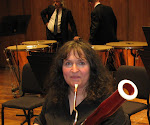Frances Poulenc lived from 1899 until 1963 in Paris. No wonder he felt so at ease with the woodwinds! France (especially Paris) was considered the epicenter of woodwind playing during his lifetime. In fact, there were some U.S.conductors during the first half of the 20th century who insisted upon hiring their entire woodwind sections from France, which, of course, meant that le basson français was used instead of the German bassoon which is used in today's American orchestras.
Poulenc described his Sextour as "chamber music of the most straightforward kind: an homage to the wind instruments I have loved from the moment I began composing." The piece is fundamentally light-hearted, but with many sudden mood shifts which were so characteristic of Poulenc's writing- a playful, jaunty phrase is sure to be followed with melancholy. (The music critic Claude Rostard described Poulenc as "part monk, part guttersnipe.")
Poulence used the bassoon in this piece for the jovial as well as the mournful effects. In fact, twice he sends the bassoon out on a solo mission to promote seriousness. The unaccompanied solo in the first movement:
often sounds unwieldy to me. While thinking about how I wanted to approach it, I tried to bear in mind that it was written for the French bassoon- the light, nimble and lyrical French bassoon. I have heard American bassoonists phrase this solo in a manner I don't care for. Specifically, the phrase seems to stop and start, with vibrato being applied to certain quarter notes (which to me sounds affected). I prefer a more smooth approach, striving for the long line. Because of the solo's built-in awkwardness, though, this is easier said than done!
Toward the end of the piece, the same unaccompanied solo morphs a bit and descends into the lower range, with similar phrasing challenges:
Poulenc was a great pianist, and he played the premier of this work himself. The piano definitely takes a leading role in this piece, rather than one of accompaniment, and we were fortunate to work with a pianist of Ms. Min's caliber.
If you'd like to hear our performance, here it is:






3 comments:
Good post, Betsy. The playful spirit of Poulenc's music comes through in your writing about it. I learned a few things about Poulenc, too.
Thank you, David. I did try to write this post in Poulenc style, I think, subconsciously maybe....
I love the word "guttersnipe."
Betsy
Betsy, nice posting.. I really liked hearing your take on the solo passage in the first mvt. I also enjoyed the entire performance!.. Thanks.
Post a Comment